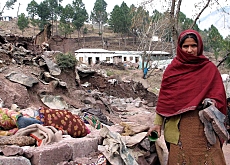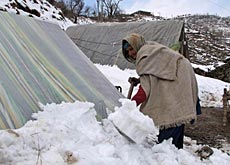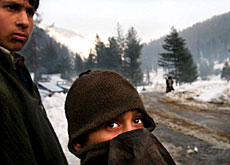Earthquake survivors start to head home

Swiss aid workers in Pakistan say five months after the earthquake that killed more than 73,000 people, survivors are beginning to return home.
The Swiss Agency for Development and Cooperation (SDC) said on Thursday that the mild winter, coupled with the huge international aid operation, had averted fears of a second wave of deaths.
“The exceptionally mild winter helped a lot and spring has come maybe one month early,” said Edwin Brunner, the SDC’s humanitarian aid coordinator in Islamabad.
“In some areas people have started packing up and leaving the camps. People really want to return home and start leading independent lives again.”
Brunner told swissinfo that the relief camps, which housed 200,000 people during the winter, had been due to shut at the end of the month but this date had been postponed because not everyone was in a position to leave.
According to Brunner, widows, the injured and those living at higher altitudes will face a longer wait. The United Nations says road accessibility will remain a major challenge and helicopters will have to continue to airlift provisions to some areas.
“We still expect problems when the snow melts at higher altitude. This destabilises rock formations and there might be heavy landslides. These can be very serious, sweeping away entire villages, and it’s something we have to reckon with,” added Brunner.
Disaster zone
Specialists from the Swiss Humanitarian Aid Unit (SHA) were based throughout the winter in the region of Mansehra and Balakot, which was one of the worst hit areas.
In the aftermath of October’s earthquake the SDC helped to distribute building materials to around 10,000 families who chose to stay up in the mountains.
Swiss aid workers also distributed tents, children’s clothes, stoves and blankets to around 5,000 families in lower lying areas.
Brunner said the SDC terminated its relief effort a month ago and was now focusing on reconstruction.
One of its tasks is to rebuild schools and basic health centres in rural areas. The Swiss, with the help of the Pakistani authorities, aim to help in the construction of 80-100 schools.
The SDC is also taking part in the vast government programme to rebuild around 400,000 homes. The agency is to play a coordinating role at two housing reconstruction centres – in Balakot and Batagram – where training will be given in earthquake-resistant design techniques.
Swiss aid workers will also be working on livelihood support projects, helping communities to resume livestock farming and cultivation.
Relief operation
Brunner said the relief operation had been successful “on the whole” and he praised Pakistan’s army for taking control when the situation threatened to unravel as large numbers of aid organisations descended on the region.
He pointed out that there had been strong cooperation among Swiss agencies, adding that the SDC was working closely with Terre des Hommes, which is providing expertise on water and sanitation projects.
As the reconstruction operation gets underway, the UN said on Wednesday that it was planning a major assistance programme for the estimated three million people left homeless by the disaster.
The project covers a one-year period starting next month and has been prepared in close collaboration with Pakistani military and civil authorities.
“We have to use this opportunity to support and to encourage the support of people [to get] back to their places of origin so we can help rebuild their lives,” said UN Deputy Humanitarian Aid Coordinator Jamie McGoldrick.
He said major challenges included keeping relief operations going until the end of March, improving sanitation especially in the smaller camps and preparing for the return of internally displaced people.
swissinfo, Adam Beaumont
The SDC was among the first agencies to respond to the disaster. Within a week about 200 tons of relief supplies were transported to the area in the biggest shipment of aid ever undertaken by the Swiss authorities.
The Swiss also financed urgently needed helicopter sorties to reach families in remote areas. To date helicopters have flown more than 27,400 missions, airlifting more than 30,000 tons of food, medicine, tents, blankets and emergency building materials.
On Thursday the Swiss-run International Committee of the Red Cross said one of its Puma helicopters crashed near the Muzaffarabad heliport in Pakistan-administered Kashmir. Two crew members were injured.
Switzerland allocated SFr10 million ($7.62 million) in immediate aid for earthquake survivors.
The SDC is providing SFr6 million annually over the next three years in direct assistance to the disaster zone.
An international donor conference in Geneva in November saw $6.2 billion pledged for relief and reconstruction work.

In compliance with the JTI standards
More: SWI swissinfo.ch certified by the Journalism Trust Initiative


You can find an overview of ongoing debates with our journalists here . Please join us!
If you want to start a conversation about a topic raised in this article or want to report factual errors, email us at english@swissinfo.ch.